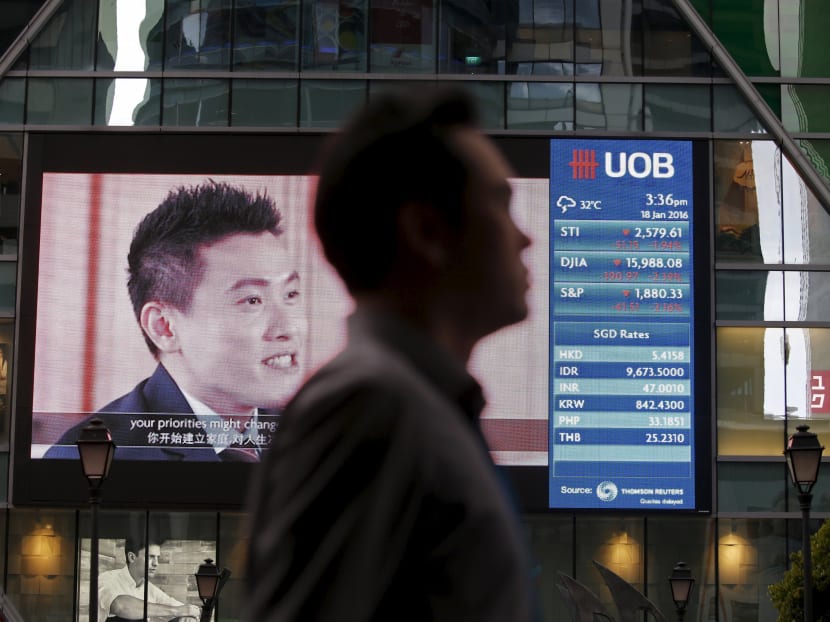Finding value in stock markets overseas
The Straits Times Index (STI) rose 18 per cent last year, which looks great – until you compare it with foreign markets. The Dow Jones Index (DJI) in the United States rose 25 per cent in the same period, for instance, and the Hang Seng Index in Hong Kong charged ahead 36 per cent. Many investors are looking at whether they should invest in foreign shares.

A man passes a board showing the decline of Straits Times Index (STI), Dow Jones Industrial Average (DJIA) and the Standard and Poor's (S&P) index at the central business district in Singapore. Reuters file photo
The Straits Times Index (STI) rose 18 per cent last year, which looks great – until you compare it with foreign markets. The Dow Jones Index (DJI) in the United States rose 25 per cent in the same period, for instance, and the Hang Seng Index in Hong Kong charged ahead 36 per cent. Many investors are looking at whether they should invest in foreign shares.
BENEFITS OF INVESTING ABROAD
The gains in foreign markets can be quite good. Along with larger gains in market indices, which benefit people who buy unit trusts or ETFs (exchange-traded funds), individual shares in those markets rose as well. In Singapore, the component companies in the STI with the largest gains in 2017 included Yangzijiang Shipbuilding, up 80 per cent, and Global Logistic Properties, which rose 53 per cent. In the US, Boeing topped the DJI with a 90 per cent gain and Caterpillar was close behind at 70 per cent. Shares in S&P 500 companies rose even more, with Align Technology up 132 per cent and NRG Energy up 121 per cent.
While indices and share prices in foreign markets go down just as they do in Singapore, there are other reasons to buy shares overseas.
Buying shares abroad enables you to diversify your portfolio, which can deliver higher returns. The factors that drive share prices in global markets vary depending on the country, so factors that affect prices in London are different from those that impact markets in Singapore or Australia. Geopolitical or tariff risks that affect Singapore may have different effects on markets in New Zealand or Canada. Diversification into investments in other countries can reduce your overall risk by offsetting losses in one market with gains in another.
You can also buy smaller numbers of shares in some other markets. Whereas the usual minimum lot size in Singapore of 100 shares could make buying Amazon at more than US$1,500 per share too expensive, you could buy a single share on US markets.
Buying abroad also allows you to pursue strategies such as buying shares in companies with new technologies that hardly exist in Singapore, such as electric vehicles, or buying shares in companies with higher dividends.
While foreign exchange rates can be volatile, they have a potential benefit and can also improve your returns. If your shares in Daimler in Germany rise 10 per cent, for example, a 10 per cent rise in the Euro could add to your profits.
CONSIDERATIONS AND RISKS
While there are benefits to buying foreign shares, there are risks and costs as well.
Just as currencies can go up, so too can they go down and either reduce gains or magnify losses.
You may also need to pay taxes on your gains or dividends. Whereas Singapore does not generally tax dividends or capital gains, some other markets do. The US, for instance, may levy a 30 per cent withholding tax on capital gains and dividends.
Moreover, brokers in Singapore often charge extra fees when you purchase foreign shares. Along with the standard fees to buy the shares, some brokerages charge a premium of up to 0.5 per cent when you buy shares in major markets or 1 per cent for smaller markets, with a minimum of S$20 to S$100. Once you buy the shares, brokerages may also charge an additional “custody fee” that is often S$2 per month per company just to hold them in your account.
HOW TO BUY
If you do decide to buy foreign shares, it has become easier than ever. Many brokerage firms here allow investors to purchase shares in markets around the globe.
OCBC Securities provides direct online access to more than 15 securities exchanges around the globe, for instance, including markets in Australia, China, Hong Kong, Indonesia, Japan, the United Kingdom and the US. Phillip Securities offers a similar though a different range of options that includes online investing in markets such as Germany and Sri Lanka. Both offer broker-assisted access to even more markets, and other firms including DBS Vickers, UOB Kay Hian and Kim Eng enable investors to buy foreign shares as well.
It is also possible to open an account in some other countries. You may be able to open an account with E-Trade or Interactive Brokers to buy shares in the US, for instance, or with NABTrade to buy shares in Australia. Fees can be cheaper at some foreign firms, and the foreign firms are unlikely to charge a custody fee.
DO YOUR RESEARCH
Just as you need to do research to select which shares to buy in Singapore, you need to do that as well to buy foreign shares. The easy option is to buy an ETF that follows a major index, such as the FTSE in the UK or the DJI in the US. Alternatively, you can read online news such as Yahoo Finance or investment magazines, attend talks, watch news shows such as CNBC or use other sources to find companies.
Buying foreign shares can indeed offer advantages, though it comes with risks as well. It’s easier than ever to buy those shares, and investors who select well can benefit significantly.






